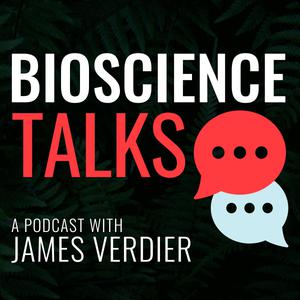
BioScience Talks
American Institute of Biological Sciences
We hope you enjoy these in-depth discussions of recently published BioScience articles and other science stories.
- 51 minutes 10 secondsOne Health (and more) with DeeAnn Reeder
For this episode of BioScience Talks, we're joined by DeeAnn Reeder, Professor of Biology at Bucknell University and a researcher at the Smithsonian Institution. We spoke about a number of topics, including bats, disease ecology, and community outreach. Underlying that conversation was an important message about the One Health concept, which will be the subject of a forthcoming special issue of BioScience.
Potential contributors to the One Health special issue can find more information here.
Read Dr. Reeder's latest paper, Ecological countermeasures to prevent pathogen spillover and subsequent pandemics | Nature Communications.
27 March 2024, 5:46 pm - 26 minutes 53 secondsSpy Satellites for Ecology, with Catalina Munteanu and Volker Radeloff
For today's episode, we're joined by Catalina Munteanu, Researcher at the University of Frieberg in Germany, who has a background in geography and forest sciences. Also joining us is Volker Radeloff, Professor at the University of Wisconsin-Madison, in the SILVIS Lab, where he works on satellite imagery to look at land use. They were here to discuss the potential value of images from Cold War-era spy satellites for current ecological research and practice.
Read their article in BioScience.
Captions are available on YouTube.
8 March 2024, 5:10 pm - 31 minutes 31 secondsPollinator Roadside Habitat, with Thomas Meinzen, Diane Debinski, and Laura Burkle
For today's episode, we're joined by Thomas Meinzen, recent Master's of Science graduate from Montana State University in Bozeman, Diane Debinski, who is a Professor and Department Head in the Department of Ecology at MSU, and Laura Burkle, a Professor also in the MSU Ecology Department. They were here to talk about the subject of their recent BioScience article, roadside verges, and in particular, the way that these habitats may prove to be a boon—or bane—for pollinating insects.
Captions are available on YouTube.
15 February 2024, 6:11 pm - 28 minutes 34 secondsShipwreck Ecology, with Avery Paxton, Chris Taylor, and Melanie Damour
For today's episode, we're joined by Avery Paxton, who is a Research Marine Biologist with NOAA's National Centers for Coastal Ocean Science, Chris Taylor, Research Ecologist, also with NOAA's NCCOS, and Melanie Damour, who is a Marine Archeologist and the Environmental Studies Coordinator with the Bureau of Ocean Energy Management's Gulf of Mexico Region Office. They were here to discuss their recent BioScience article on "Shipwreck Ecology," and the ways in which these sites can be hotspots for biodiversity—and also for research.
Read the article here.
Captions can be found on YouTube.
10 January 2024, 7:43 pm - 10 minutes 48 secondsThe Global Women in Herpetology Project (and Book), with Sinlan Poo
For today's episode, we jump back to last spring's Joint Meeting of Ichthyologists and Herpetologists. Our guest is Sinlan Poo, Curator of Research at the Memphis Zoo and one of the co-organizers of the Global Women in Herpetology Project. You may remember her from a previous interview, but we recorded an extra mini-podcast to talk about the book "Women in Herpetology: 50 Stories from Around the World," which features a diverse group of authors describing their journeys to and through the world of herpetology. Proceeds from the book's sales will fund a conference scholarship for women students.
Captions are available on YouTube.
3 January 2024, 3:49 pm - 20 minutes 40 secondsThe Re-Envisioning Culture Network, with Simone Soso
For today's episode of BioScience Talks, we're joined by Dr. Simone Soso, Assistant Director of Research and Workforce Development at the MSI STEM Research & Development Consortium. She was here to discuss the NSF-funded Re-Envisioning Culture (or REC) Network and its recent activities. I'll let her tell you more, though, so let's go to the interview.
Captions are available on YouTube.
15 December 2023, 6:06 pm - 26 minutes 19 secondsRewilding Governance, with Jeremy Bruskotter and John Vucetich
In this episode, we're joined by Jeremy Bruskotter, faculty member and Professor in the School of Environment and Natural Resources at The Ohio State University and John Vucetich, Distinguished Professor at Michigan Technological University, in the College of Forest Resources and Environmental Science. They were here to talk about their recent article in BioScience on the governance issues related to rewilding, or the restoration of native species to their traditional ranges. Read the article here.
Captions are available on YouTube.
1 December 2023, 6:43 pm - 30 minutes 50 secondsREADI-Net, with Adam Sepulveda
Our guest for this episode of BioScience Talks is Adam Sepulveda, Research Scientist with the US Geological Survey's Northern Rocky Mountain Science Center in Bozeman, Montana. He joined us to talk about READI-Net, an environmental DNA-based program that was recently funded by the Bipartisan Infrastructure Bill as a priority for addressing aquatic invasive species. Learn more about READI-Net here.
Captions are available on YouTube: https://youtu.be/2G-6AEwJE8Y
27 October 2023, 3:34 pm - 32 minutes 20 secondsOrganization of Biological Field Stations
Today’s episode features three representatives of the Organization of Biological Field Stations (OBFS), which is an American Institute of Biological Sciences member organization. We discussed many topics related to field stations, including the research performed there, as well as the ways that field stations collaborate through organizations like OBFS and AIBS to improve their research, education, and outreach efforts.
Our guests were:
Lara Roketenetz, Director of the University of Akron Field Station, in Ohio. She is also currently serving as President of the Organization of Biological Field Stations.
Rhonda Struminger, Codirector and Cofounder of the Centro de Investigaciones Científicas de las Huastecas "Aguazarca" (CICHAZ), in Calnali, Hidalgo, Mexico. She is also affiliated with the University of Padova, in Italy, and is Cochair of the OBFS's International Committee.
Chris Lorentz, Professor of Biological Sciences at Thomas More University and Director of Ohio River Biology Field Station. He is currently serving as Past President of OBFS.Learn more about OBFS and their ongoing efforts on their website.
Captions can be found on YouTube.
19 October 2023, 4:52 pm - 59 minutes 39 secondsOn Site at the Joint Meeting of Ichthyologists and Herpetologists
This episode of BioScience Talks was recorded on location at the Joint Meeting of Ichthyologists and Herpetologists in Norfolk, Virginia, and features a range of presenters and organizers.
Our first guests were Sinlan Poo, who is Curator of Research at the Memphis Zoo and affiliated with Arkansas State University, and Prosanta Chakrabarty, who is Curator of Fishes and a Professor at Louisiana State University's Museum of Natural Science. Dr. Chakrabarty is also the current President of the American Society of Ichthyologists and Herpetologists, one of the organizations that convened the meeting. They joined me to talk about the ZooMu symposium, which was held as part of the meeting. Read more about zoo and museum collaboration in BioScience.
Next up, I sat down with Karen Caceres from Old Dominion University. She spoke about Florida cottonmouths and how they manage to live on small islands that typically lack freshwater resources.
Maisie MacKnight, PhD candidate at Penn State, gave a talk about fieldwork and the ways in which it can be made safe and inclusive for all participants. We discussed her talk, as well as some of her other work.
Oliver Shipley, Research Professor at Stony Brook University in New York, and Maria Manz, a graduate student at Stony Brook University, joined me to talk about sharks, their movement, and the ways that scientists study them.
Erin Anthony, President of the Virginia Herpetological Society, chatted with me about her organization's public outreach efforts, as well as herps native to Virginia.
Last, I was joined by Sarah Yerrace, a master's student at the University of Washington in the School of Aquatic and Fishery Sciences. Her talk was focused on the invasive lionfish, and we chatted about a new approach to surveying their abundance at deep ocean depths.
Captions are available on YouTube.
28 September 2023, 5:05 pm - 27 minutes 43 secondsWolf Recovery and Its Challenges, with David Mech and David Ausband
For today's episode, we were joined by L. David Mech, from the US Geological Survey’s Northern Prairie Wildlife Research Center and the University of Minnesota in St. Paul and David E. Ausband, from the Idaho Cooperative Fish and Wildlife Research Unit, at the University of Idaho. They were here to talk about the successful recovery of gray wolves in North America, and in particular, the challenges associated with that success. Below is a brief article describing their BioScience article.
____
Over the past 30 years, efforts to recover gray wolf populations in the United States have been broadly successful, with many regions now sporting robust populations of the charismatic carnivore. Writing in BioScience, wolf experts David E. Ausband and L. David Mech describe the conservation landscape and also the obstacles that wolves face as their populations expand into their historical ranges."Remarkable wolf conservation success yields remarkable challenges," say the authors, as 6000 wolves now occupy habitat across 11 states. These growing populations now face significant threats as they attempt to colonize human-dominated areas, among them "fragmented habitats and barriers to dispersal, as well as increased encounters with humans, pets, and livestock."
In response to those concerned about wolves’ potential impacts to prey populations and domestic livestock production, many jurisdictions have ramped up wolf efforts. For instance, in Wisconsin, "the legislature requires a public hunting or trapping season whenever wolves are delisted from the US Fish and Wildlife Service’s (USFWS) list of Endangered species." In contrast, wolves are seen as desirable in other areas, such as Colorado, where voters recently passed a ballot initiative to reintroduce them in the state. The authors caution that such pro-reintroduction initiatives, which may seem initially promising for wolves, could have the unintended consequence of setting precedent for laws barring reintroduction and thus complicate management. An uncertain regulatory regime, say Ausband and Mech, could cause major fluctuations in wolf populations, with dire consequences for conservation efforts.
The answer to this quandary, the authors suggest, is thoughtful management that carefully considers the needs of diverse stakeholders: "Future wolf conservation in the United States will be affected by the ability of managers to predict colonization and dispersal dynamics, to reduce hybridization and disease transmission, to mitigate and deter wolf–livestock conflicts, to harvest wolves sustainably while satisfying diverse stakeholders, to avert a reduction in tolerance for wolves due to a disinterest in nature, and to engage diverse stakeholders in wolf conservation to avoid management by ballot initiative or legislative and judicial decrees." Only through such science-informed management, argue Ausband and Mech, can the present success of wolf conservation be built on in the future.
Captions for this episode are available on YouTube.
6 September 2023, 6:01 pm - More Episodes? Get the App
Your feedback is valuable to us. Should you encounter any bugs, glitches, lack of functionality or other problems, please email us on [email protected] or join Moon.FM Telegram Group where you can talk directly to the dev team who are happy to answer any queries.
 Science Magazine Podcast
Science Magazine Podcast
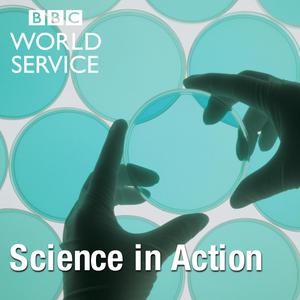 Science In Action
Science In Action
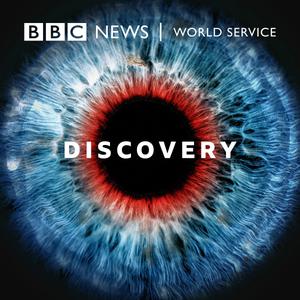 Discovery
Discovery
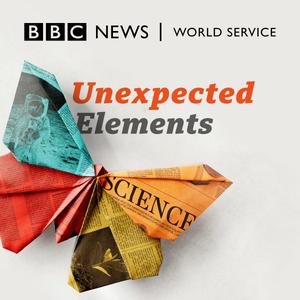 Unexpected Elements
Unexpected Elements
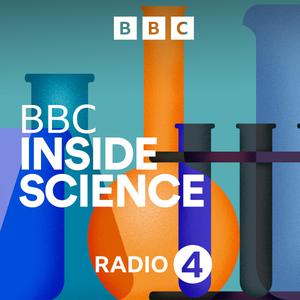 BBC Inside Science
BBC Inside Science
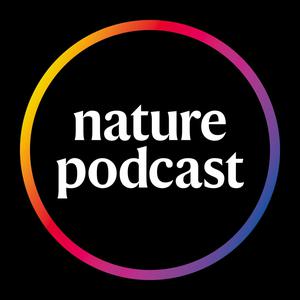 Nature Podcast
Nature Podcast